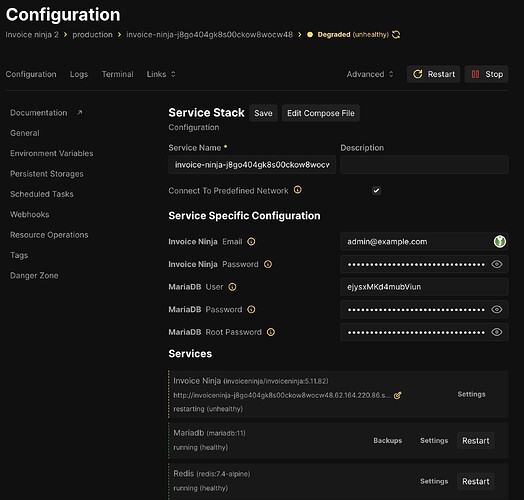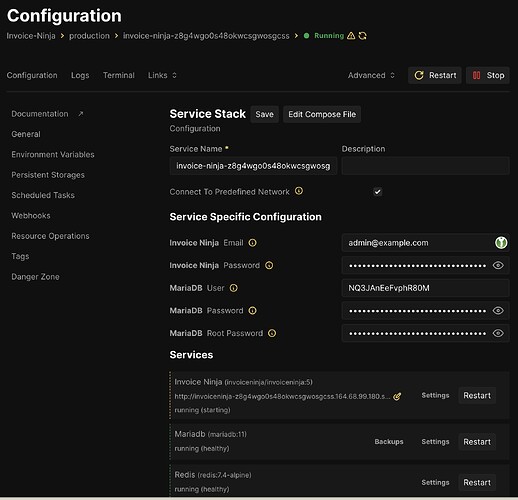Version
v5.10.60 (image: invoiceninja/invoiceninja:5 via Coolify)
Environment
Docker (via Coolify on remote VPS)
Checklist
- Can you replicate the issue on our v5 demo site https://demo.invoiceninja.com or [https://react.invoicing.co/demo]?
 Not applicable – issue is with self-hosted environment.
Not applicable – issue is with self-hosted environment. - Have you searched existing issues?
 Yes
Yes - Have you inspected the logs in storage/logs/laravel.log for any errors?
 Cannot access logs – container restarts before Invoice Ninja is fully booted.
Cannot access logs – container restarts before Invoice Ninja is fully booted.
Describe the bug
When deploying Invoice Ninja through Coolify on a remote VPS (i.e., an agent not marked as localhost), the container fails to start and enters a crash loop. Attempting to access the service URL results in a “Bad Gateway”, “404 Not Found”, or “No available server” error.
The container logs show the following repeated error:
Error: could not read config file /etc/supervisord.conf
This file is not part of the official Invoice Ninja image, and the image does not use supervisord by default.
Despite trying overrides or Docker Compose edits to add the missing file, the issue persists — only when deployed on a remote VPS via Coolify. The exact same deployment works when targeting the main Coolify server (localhost).
This suggests the issue may be related to how Coolify orchestrates services on remote agents, possibly expecting or injecting process management logic (supervisord) not present in the base image.
Steps To Reproduce
- Deploy Invoice Ninja (v5.10.60) via Coolify on a remote agent.
- Use the default Docker image and configuration.
- Start the app.
- Watch the container enter a restart loop.
- Try accessing the service — receive gateway or 404 errors.
Expected Behavior
Invoice Ninja should start properly and be accessible via the configured domain, without relying on a nonexistent supervisord.conf.
Additional context
- Coolify is fully updated (June 2025).
- Other apps like
n8n,glance, etc. run correctly on the same remote VPS. - The “Predictify network” option in Coolify does not solve the issue. But make it possible for Invoice Ninja to be accessible by Coolify reverse proxy. But it still crash.
- Manual container inspection of
supervisord.confimpossible due to the restart. - The official Invoice Ninja image works fine outside of this Coolify remote server scenario.
- I’ve tried even with other version (5.11.82 and other…)
Screenshots
Image 5.11.82
Image : 5
Docker compose in coolify
services:
invoice-ninja:
image: 'invoiceninja/invoiceninja:5'
environment:
- SERVICE_FQDN_INVOICENINJA
- 'APP_NAME=${APP_NAME:-"Invoice Ninja"}'
- 'APP_ENV=${APP_ENV:-production}'
- 'APP_URL=${SERVICE_FQDN_INVOICENINJA}'
- 'APP_KEY=base64:${SERVICE_REALBASE64_INVOICENINJA}'
- 'APP_DEBUG=${APP_DEBUG:-false}'
- 'REQUIRE_HTTPS=${REQUIRE_HTTPS:-false}'
- 'PHANTOMJS_PDF_GENERATION=${PHANTOMJS_PDF_GENERATION:-false}'
- 'PDF_GENERATOR=${PDF_GENERATOR:-hosted_ninja}'
- 'TRUSTED_PROXIES=${TRUSTED_PROXIES:-*}'
- CACHE_DRIVER=redis
- 'QUEUE_CONNECTION=${QUEUE_CONNECTION:-redis}'
- SESSION_DRIVER=redis
- 'REDIS_HOST=${REDIS_HOST:-redis}'
- 'REDIS_PASSWORD=${SERVICE_PASSWORD_REDIS}'
- 'REDIS_PORT=${REDIS_PORT:-6379}'
- 'DB_HOST=${DB_HOST:-mariadb}'
- 'DB_PORT=${DB_PORT:-3306}'
- 'DB_DATABASE=${DB_DATABASE:-invoiceninja}'
- 'DB_USERNAME=${SERVICE_USER_MARIADB}'
- 'DB_PASSWORD=${SERVICE_PASSWORD_MARIADB}'
- 'IN_USER_EMAIL=${IN_USER_EMAIL:[email protected]}'
- 'IN_PASSWORD=${SERVICE_PASSWORD_INVOICENINJAUSER}'
- 'MAIL_MAILER=${MAIL_MAILER:-log}'
- 'MAIL_HOST=${MAIL_HOST}'
- 'MAIL_PORT=${MAIL_PORT}'
- 'MAIL_USERNAME=${MAIL_USERNAME}'
- 'MAIL_PASSWORD=${MAIL_PASSWORD}'
- 'MAIL_ENCRYPTION=${MAIL_ENCRYPTION}'
- 'MAIL_FROM_ADDRESS=${MAIL_FROM_ADDRESS}'
- 'MAIL_FROM_NAME=${MAIL_FROM_NAME}'
- 'AWS_ACCESS_KEY_ID=${AWS_ACCESS_KEY_ID}'
- 'AWS_SECRET_ACCESS_KEY=${AWS_SECRET_ACCESS_KEY}'
- 'AWS_DEFAULT_REGION=${AWS_DEFAULT_REGION}'
- 'AWS_BUCKET=${AWS_BUCKET}'
- 'AWS_URL=${AWS_URL}'
- 'AWS_ENDPOINT=${AWS_ENDPOINT}'
- 'NORDIGEN_SECRET_ID=${NORDIGEN_SECRET_ID}'
- 'NORDIGEN_SECRET_KEY=${NORDIGEN_SECRET_KEY}'
- IS_DOCKER=true
- 'SCOUT_DRIVER=${SCOUT_DRIVER}'
- 'LICENSE_KEY=${LICENSE_KEY}'
healthcheck:
test:
- CMD
- echo
- ok
interval: 5s
timeout: 20s
retries: 10
volumes:
- 'invoice-ninja-public:/var/www/app/public'
- 'invoice-ninja-storage:/var/www/app/storage'
-
type: bind
source: ./supervisord.conf
target: /etc/supervisord.conf
content: "[supervisord]\nnodaemon=true\npidfile=/tmp/supervisord.pid\nlogfile=/dev/null ; nodaemon will cause logs to go to stdout\nlogfile_maxbytes=0\nloglevel=info\n\n[program:php-fpm]\nredirect_stderr=true\nstdout_logfile=/dev/stdout\nstdout_logfile_maxbytes=0\nstderr_logfile=/dev/stderr\nstderr_logfile_maxbytes=0\ncommand=php artisan serve --host 0.0.0.0 --port 9000\n\n[program:scheduler]\nautorestart=true\nredirect_stderr=true\nstdout_logfile=/dev/stdout\nstdout_logfile_maxbytes=0\nstderr_logfile=/dev/stderr\nstderr_logfile_maxbytes=0\ncommand=php artisan schedule:work\n\n[program:queue-worker]\nprocess_name=%(program_name)s_%(process_num)02d\nautorestart=true\nredirect_stderr=true\nstdout_logfile=/dev/stdout\nstdout_logfile_maxbytes=0\nstderr_logfile=/dev/stderr\nstderr_logfile_maxbytes=0\nnumprocs=2\ncommand=php artisan queue:work --sleep=3 --tries=1 --memory=256 --timeout=3600\n\n[eventlistener:shutdown]\ncommand=shutdown.sh\nevents=PROCESS_STATE_STOPPED, PROCESS_STATE_EXITED, PROCESS_STATE_FATAL\nstdout_logfile=/dev/stdout\nstdout_logfile_maxbytes=0\nstderr_logfile=/dev/stderr\nstderr_logfile_maxbytes=0\n"
-
type: bind
source: ./php.ini
target: /usr/local/etc/php/php.ini
content: "session.auto_start = Off\nshort_open_tag = Off\n\nerror_reporting = E_ALL & ~E_NOTICE & ~E_WARNING & ~E_STRICT & ~E_DEPRECATED\n\n; opcache.enable=1\n; opcache.preload=/srv/www/invoiceninja/current/preload.php\n; opcache.preload_user=www-data\n\n; ; The OPcache shared memory storage size.\n; opcache.max_accelerated_files=300000\n; opcache.validate_timestamps=1\n; opcache.revalidate_freq=30\n; opcache.jit_buffer_size=256M\n; opcache.jit=1205\n; opcache.memory_consumption=1024M\n\npost_max_size = 60M\nupload_max_filesize = 50M\nmemory_limit=512M\n"
-
type: bind
source: ./php-cli.ini
target: /usr/local/etc/php/php-cli.ini
content: "session.auto_start = Off\nshort_open_tag = Off\n\nerror_reporting = E_ALL & ~E_NOTICE & ~E_WARNING & ~E_STRICT & ~E_DEPRECATED\n\n; opcache.enable_cli=1\n; opcache.fast_shutdown=1\n; opcache.memory_consumption=256\n; opcache.interned_strings_buffer=8\n; opcache.max_accelerated_files=4000\n; opcache.revalidate_freq=60\n; # http://symfony.com/doc/current/performance.html\n; realpath_cache_size = 4096K\n; realpath_cache_ttl = 600\n\nmemory_limit = 2G\npost_max_size = 60M\nupload_max_filesize = 50M\n"
depends_on:
mariadb:
condition: service_healthy
mariadb:
image: 'mariadb:11'
volumes:
- 'mariadb-data:/var/lib/mysql'
environment:
- 'MYSQL_ROOT_PASSWORD=${SERVICE_PASSWORD_MARIADBROOT}'
- 'MYSQL_DATABASE=${DB_DATABASE:-invoiceninja}'
- 'MYSQL_USER=${SERVICE_USER_MARIADB}'
- 'MYSQL_PASSWORD=${SERVICE_PASSWORD_MARIADB}'
healthcheck:
test:
- CMD
- healthcheck.sh
- '--connect'
- '--innodb_initialized'
interval: 5s
timeout: 20s
retries: 10
redis:
image: 'redis:7.4-alpine'
command: 'redis-server --requirepass ${SERVICE_PASSWORD_REDIS}'
environment:
- 'REDIS_PASSWORD=${SERVICE_PASSWORD_REDIS}'
volumes:
- 'invoice-ninja-redis-data:/data'
healthcheck:
test:
- CMD
- redis-cli
- '-a'
- '${SERVICE_PASSWORD_REDIS}'
- ping
interval: 10s
timeout: 5s
retries: 5
Logs
Error: could not read config file /etc/supervisord.conf
For help, use /usr/bin/supervisord -h
(repeats endlessly)
Final Note
I’m not a developer. I’ve tried my best to investigate the issue — reading forum posts, tweaking settings on my VPS, and chatting with ChatGPT. I don’t fully understand everything, so I apologize if this report lacks precision or duplicates an existing issue I may have misunderstood.
Thank you in advance for your help.

